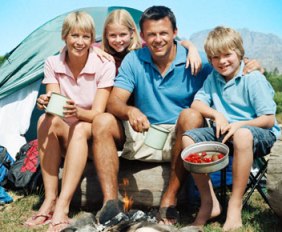
However, the benefits of the fresh air and active lifestyle are sometimes countered by the fact that when camping the range of food open to you is less than at home, and this can lead to unhealthy eating which is not good for your weight loss plan.
But, even with the restrictions of camping kitchens, there are several things you can do to keep your diet healthy and your weight loss plan on track while away from home.
Restrictions when Camping
The main restriction when camping is the lack of refrigeration. It can be very difficult to store fresh food like meat and fish, and dairy products like cheese and eggs. Most people camp with a small gas burner, so cooking also poses challenges. Because of this, and also because people don’t want to spend their entire camping trip preparing food, most campers eat packet and tinned food for simplicity and convenience.
Plan your meals
When planning your camping trip, try to think before you leave about what you are going to eat for at least one meal per day. This will lessen the likelihood of wanting to snack on high calorie foods such as chocolate bars and potato chips. Depending on where you are camping, consider also whether you will have access to local shops to buy fresh food such as fish, meat or fruit. As food can be heavy, planning what you are going to eat and when will mean you don’t end up carrying things you won’t eat and will spoil or go off in the heat.
Simple cooking
When camping, it is best to stick to foods which don’t require a huge amount of preparation. Pasta, rice and couscous can be quickly and easily prepared with a single pan. Choose wholewheat pasta and brown rice as they are packed with fibre and as this is harder for the body to digest, keeps you feeling fuller for longer, meaning you are less likely to snack. Other foods which are simple to cook while camping and pack a punch when it comes to nutrition are eggs which are full of protein and oats, which can be made into a nutritious porridge for breakfast.
Tins and Packets
Not all tins and packets are bad news nutritionally, and items like tinned tuna or salmon should be top of any camper’s shopping list. Fish is high in protein and oily fish like salmon is a great source of Omega 3 essential oils which contribute to brain development. Tins of fish have a very long shelf life and do not require to be refrigerated, making them the ideal thing to take camping. Tins of beans and pulses such as kidney beans or lentils should also be taken as they are versatile and can be added to soups, stews or rice. Beans and pulses are low in calories and high in fibre.
Snacks
Although it may be tempting to take a backpack full of chocolate and potato chips, it is far better to think about taking snacks which will both satisfy your hunger and help you with your weight loss See here for our list of healthy snacks. The ideal snacks are nuts and dried fruit. Although high in calories, nuts and fruit are packed with minerals, vitamins and fibre and are therefore far more nutritious than chocolate. Other portable snacks include cereal bars made with wholewheat and nuts, bananas and apples. Try to stick to water or diluted fruit juice to drink, rather than high calorie soft drinks or beer. See here for the best nuts for weight loss
